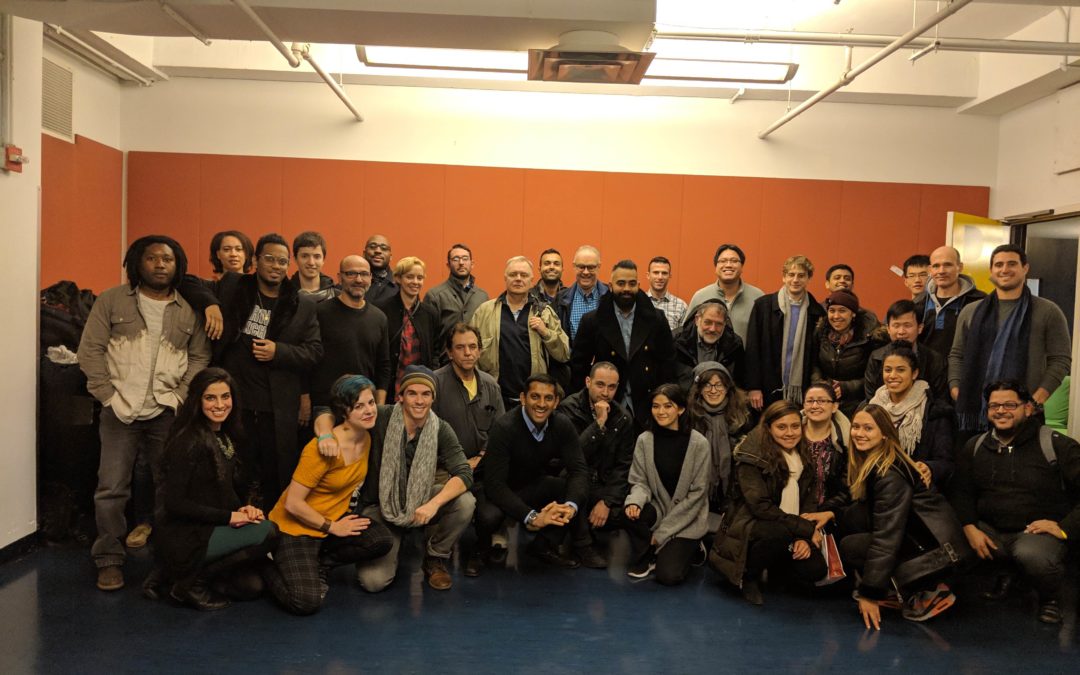
by NSA Manhattan | Dec 22, 2018 | Recaps
We met on our regular 3rd Monday of the month on December 17th. Around 25 people who stutter showed up and as per usual, we split up into 3 groups for more intimate discussions.
In one of the groups, the topic of confidence and how it pertains to our stuttering came up. We discussed how many of us who stutter are generally sensitive people. For some of us, this sensitivity includes how we are perceived while speaking. A few members expressed that when speaking on a topic they are passionate about, they feel more reassured and confident than usual and as a result, seemingly care less about disfluencies. But on the other hand, one member shared that as people who stutter, we may face extra scrutiny because in a fluent world, someone who has disfluencies may mistakenly appear nervous, incompetent, or even untrustworthy to listeners.
Another group started the night by talking about avoidances and advertising. Members shared that often they are tempted to avoid their stuttering at work or during social situations, and this pull towards avoidance can many times feel overwhelming and all-encompassing. One member shared his recent experience of self-advertising at work. After many years of being covert about his stuttering, self-advertising and “coming out’ as a person who stutters at work felt liberating. Collectively, we explored how taking small steps to be more open about stuttering-whether 1:1, in a small or large-group setting-can enable us to get a little closer to stuttering acceptance.
In the last group, we began with a particularly vulnerable discussion of mental health and stuttering. Often times, these groups can be a beacon of positivity and light around stuttering, but it is always a meaningful reminder that this is our space and we can fill it with whatever we need to release for the hour or so we share together. We then went on to talk about the internalization of stuttering and growing up with this looming belief of body failure and misrepresentation. Different members shared different manifestations of this internalization. It can be the hesitation or regret when sharing ideas in a group, or it can be the over-analyzation of a simple interaction or feeing.
As 9 o’clock neared, we re-grouped as whole, read our closing words, and ended the night on a high. As per tradition, a few of us headed to the local bar after and had a drink or two and continued socializing on a lighter note.
We want to thank everyone for all the energy they have contributed to growing and deepening our abundant stuttering community this year. It is this energy that we are all so grateful for and brings us back together every month. So, thank you for acknowledging each and every single one of our stuttering journeys and your own. We are wishing you the happiest of all holidays and can’t wait to reconnect in 2019.
Upcoming Events in the New Year – 2019!
- Improv Seminar with our very own Marc Winski – Sunday, January 20th
- This event will be at our regular meeting space at 520 Eighth Avenue from 2-4pm.
- More details to come!
- SMBC Mock Interview Event hosted by our very own Kunal Muhajan – Thursday, January 31
- This is an incredible networking opportunity for people who stutter to give and receive interviewing feedback.
- Here is the link with more information, as well as online registration for the upcoming event!
- For more information regarding this event, contact: Kunal Mahajan at kunal_mahajan@smbcgroup.com.

by Chaya Goldstein | Dec 17, 2018 | Recaps
We had an exceptional month at our chapter with two very well attended and diverse meetings. The first meeting was on the third Monday of the month and attended by 35 people, including 2 first timers and 4 SLP’s. The second meeting was held on the last Wednesday of November and was a collaboration between 8 dedicated SLP (Speech- Language Pathologist) and 10 people who stutter. The conversations during the meetings were varied and stimulating. Topics ranged from stuttering and identity, to stuttering and language, to stuttering trauma and healing, and of course, lots of learning and sharing. Here are some of the highlights of the nights:
Stuttering Across Different Languages
We started the night off discussing stuttering across different languages. One member had recently taken a trip to Mexico City and shared how on top of the language barrier, there was a sort of stuttering barrier. Whether it is a lack of confidence in the language, new sounds, cultural defensiveness, or perfectionism, we all agreed that learning a foreign language or communicating with someone speaking a foreign language could cause stress and anxiety, which can enhance stuttering. We then continued the conversation of stuttering, stress, and anxiety to our everyday lives. As great and motivational as these support groups can be, the reality is we are all stuttering every day in worlds that feel so fluent. So, we devoted some good, therapeutic energy to exploring these emotions and justifying our experiences. Stuttering can be extremely overwhelming and taxing on the soul, but we hope that groups like this can inspire feelings of connectedness and validation.
Feelings Surrounding Stuttering and Identity
A question came up of whether it was possible to reach a point where no negative emotions would be felt when identifying themselves as a person who stutters, either to a listener or oneself. One of the members expressed that for him there are and there will continue to be many emotions and thoughts that he feels when identifying as a person who stutters. Stuttering has led him to feel much pain in his life, and it continues to do so at times. But it has also brought him the ability to connect with others in a way he may not have been able to if it were not for his stuttering. It has also helped him become an effective communicator by examining speaking in a different light. And stuttering has brought him to this wonderful community of others who can connect with him in a way that most others cannot.
Relationship Between Stuttering and Trauma
What role does traumatic stuttering experiences from the past play into our present day life? This question surfaced after someone reflected how he found himself perplexed by the intensity of his fears surrounding stuttering in his present day life, despite his high levels of choice and stability. This question led to a heated conversation about the mismatch between the perceived danger surrounding moments of stuttering and the reality of that moment. Many people opened their hearts to share about times they were confused or surprised by the intense response they had to a stuttering moment, and how to this day they can’t wrap their heads around it. The conversation morphed into the latest research on trauma and the brain, including healing modalities for traumatic experiences such as mindfulness, yoga and meditation. The larger question about the connection between stuttering and trauma remained at the end of the night, and several eager participants talked about their interest to explore the topic more outside of the room.
SLP Collaborative Meeting
Our third year in a row SLP collaborative meeting was a huge success. Led by the SLP Liaisons’ Chani Markel and Chaya Goldstein, the night forged a deeper connection between people who stutter and SLP’s. Authentic questions from SLP’s and people who stutter were addressed, including the most effective ways to support people who stutter. People who stuttered got to share their experiences of therapy and the ways they felt SLP’s could support people who stutter in and out of therapy. It was a night of mutual growth, understanding, and support, one we look forward to replicating in the future.


